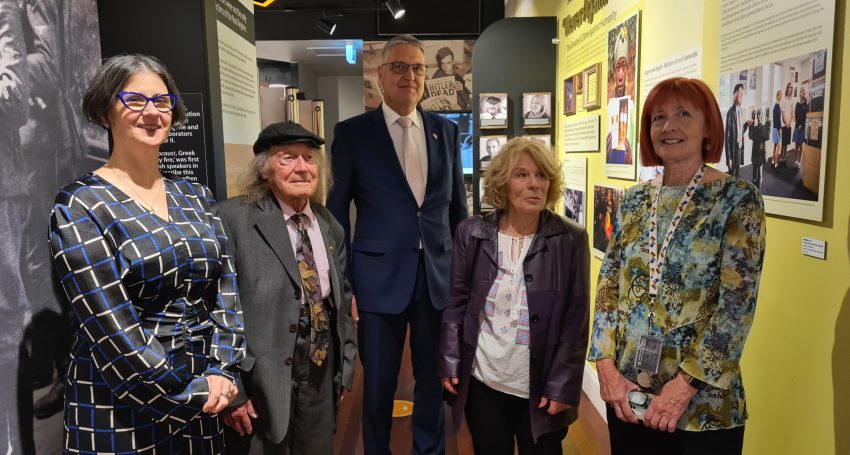Holocaust learnings for crimes against Ukraine
News
The German Ambassador to Australia, Dr Markus Ederer, has stressed the importance of holding Russia accountable for the crime of aggression against Ukraine at the launch of an exhibition in Adelaide honouring the first generation of Holocaust researchers.

Speaking at the official opening of Crimes Uncovered, a travelling exhibition at the Adelaide Holocaust Museum and Andrew Steiner Education Centre, on December 13, Dr Ederer said the first generation of Holocaust researchers shaped the foundation of our current knowledge of the Holocaust.
“Let me say we are deeply indebted to these pioneers of Holocaust research and today pay tribute to them,” he said.
Prepared by the Memorial and Educational Site House of the Wannsee Conference and Touro College in Berlin in cooperation with the Wiener Library in London, the exhibition traces the stories and the legacies of the individuals and institutions who worked during and immediately after the Holocaust to record and collect information of atrocities and bring perpetrators to justice.
Advertisement
“These historians and academics resisted the Nazi plan to destroy all Jewish people, culture and remembrance and they pioneered the establishment of an international legal framework accompanying the establishment of the United Nations,” Dr Ederer said.
The exhibition is sponsored by the German Federal Foreign Office and has been on view at the UN Headquarters in New York and the Federal Foreign Office in Berlin.
Dr Ederer said when talking about documenting and prosecuting war crimes in Ukraine, people ask how the perpetrators can be held accountable and ultimately brought to justice.
“Some talk about a Nuremberg moment,” he said.
“The establishment of the International Military Tribunal at Nuremberg by the Allied powers was a gift to Germany and to humankind.
“The tribunal tried 22 major Nazi German diplomatic, economic, political, and military leaders for crimes against peace, war crimes, and crimes against humanity, and for conspiracy to commit each of these crimes.”
But he said it was “both surprising and irritating that at Nuremberg, the Shoah, or Holocaust, was not judged to have been a genocide.
“It fulfilled all the criteria,” he said.
“But, in fact, not the Shoah was at the centre of the Nuremberg trials, but the war crimes.
“The outlawing of war, finding a new world justice, was the aim of the responsible prosecutors.
“They later admitted that they only fully grasped the magnitude of the Shoah and the unspeakable evil of concentrations camps during the course of the trials when they were shown the respective pictures and films.
“The moral, legal and historical implications of Nuremberg’s legacy must never be forgotten. But we must also bear in mind the shortcomings.”
In the case of Russia’s atrocities perpetrated in Ukraine, Dr Ederer said the Hague-based International Criminal Court (ICC) launched its own investigation into alleged crimes against humanity and war crimes.
But the ICC does not have jurisdiction to prosecute Russia’s aggression against Ukraine. Furthermore, Russia and Ukraine have not signed up to its statutes.
“Faced with this accountability gap the question has been raised whether to create a special international tribunal that could hold Russia’s leadership accountable for the war of aggression against Ukraine,” he said.
Advertisement
“We are currently looking at various options in the European Union; Germany is, overall, open as to the outcome of this discussion.
“At the same time, as you can imagine, there are many equities that we would need to consider before deciding to support such a proposal or similar. Establishing such a tribunal would have major implications, including potentially, like the one in Nuremberg, for the development of international law.”
Dr Ederer warned against rushing into “something so momentous”.
“We would need to determine how a tribunal might interact with other accountability mechanisms, including the International Criminal Court,” he said.
“Therefore we need to strike a balance between the wish to close the accountability gap and a number of challenges including the immunity of state officials.”
Beyond the ongoing investigations at the ICC, Germany, like 13 other EU member states, is applying the principle of universal jurisdiction in order to impose accountability through its domestic legal process. Germany’s Federal Public Prosecutor General has opened structural investigations into war crimes and crimes against humanity in Ukraine based on Germany’s Code of Crimes against International Law that was enacted in 2002.
“In conclusion, serious efforts are undertaken to hold all perpetrators in this conflict at all levels of the command chain accountable for war crimes and allegations of genocide,” Dr Ederer said.
“A decision to create a special tribunal dealing with the crime of aggression will still take some time as it would require the broadest possible international legitimization…and must not weaken the ICC.
“The first generation of Holocaust researchers whom we are honouring today, remind us that no crime against humanity must go unpunished. Because impunity and lack of accountability will breed such crimes in the future.”
Crimes Uncovered is being held until January 29. For details, please visit Crimes Uncovered: The First Generation of Holocaust Researchers Exhibition – Adelaide Holocaust Museum and Andrew Steiner Education Centre (ahmsec.org.au)












Comments
Show comments Hide comments